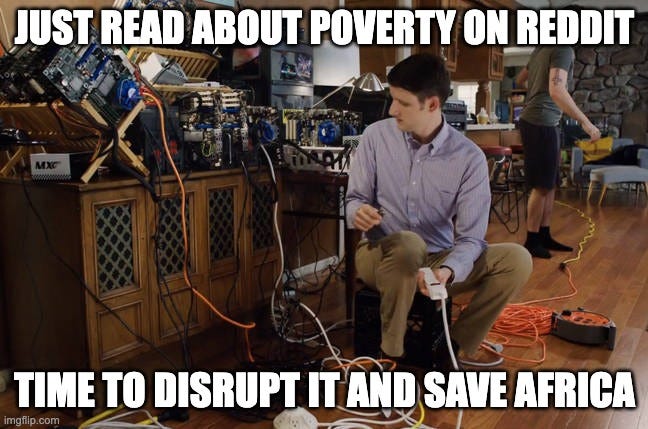Worship Wealth, Lose Souls
A Kazakhstani’s guide to escaping the American delusion of meritocracy, and finding freedom in “enough.”
1. The Hero Phase: Chasing the Wild West Mirage
“You either die a hero, or you live long enough to see yourself become the villain.”
— Harvey Dent, The Dark Knight
Living in the U.S., I worshipped tech’s “Wild West” mythos—the lie that raw talent and audacity could solve any problem. FAANG wasn’t just a job; it was a cult offering absolution through stock options and kombucha kegs. But when I moved to Berlin and told friends I’d fled LA and New York, their first question was: “Why?”
“You heard of this guy Trump?” I’d say. We’d laugh, roll our eyes, and bond over memes of Melania’s “I REALLY DON’T CARE” jacket.
But beneath the jokes, we knew:
America exports innovation like it exports chaos—with zero accountability.
Take Zuckerberg’s “Move fast and break things.”
Translation: “Move fast to IPO, break things for profit, and if the rubble buries people, lobby Congress (read: legalized bribery) to call it ‘progress.’”
How is lobbying different from the bribes I saw growing up in Kazakhstan?
🇺🇸 American corruption: Wear a Patagonia vest, call it “advocacy,” and donate to PACs.
🇰🇿 Ex-Soviet corruption: Slip cash in a vodka bottle.
At least the vodka bottle is honest.
Lesson: Silicon Valley isn’t the Wild West. It’s a theme park where tech bros LARP as cowboys—riding meme coin pump instead of horses, “disrupting” communities instead of saving them, and leaving the rest of us to clean up the tumbleweeds of broken APIs and democracy.
2. The Silicon Savior Delusion
Silicon Valley’s favorite pastime? Playing messiah. “Occupy Mars! Non-fungiable Token to support artists! Sports Betting - we’re democratizing sports engagement! Own your fandom” Some even believe their own bullshit. But how can Stanford grads—who think “Africa is a country” and confuse Oslo for an IKEA product—solve global problems?
Their secret sauce?
VC cash: Infinite money for “Uber for laundry” apps, none for fixing public schools.
American exceptionalism: The unshakable belief that a dude who’s never left Palo Alto knows what rural India really needs.
Disruption fetishism: Burning down libraries to sell Kindles.
The irony? These “visionaries” don’t solve problems—they manufacture crises to exploit.
Dying middle class? Perfect! Sell them crypto as a retirement plan.
Housing shortage? Disrupt it! Turn homes into Airbnb ghost hotels.
Democracy crumbling? “Here’s an app!” (Terms: Surrender your privacy.)
And when they fail? “Move fast and break things—that’s our culture!” Translation: “We’ll shit on your city, call it ‘innovation,’ then pay PR firms to mop up the backlash.”
Lesson: Silicon Valley’s “great responsibility” is just PR for greed. Their true mission? Turning your despair into a SaaS subscription—because even apocalypse survivors need cloud storage.
3. The God Complex & the Yes-Man Trap
“Absolute power corrupts absolutely.”
— Lord Acton
I once idolized Marc Andreessen. His book The Hard Thing About Hard Things was my PM bible. Peter Thiel’s Zero to One? Gospel. These men were Silicon Valley’s prophets—until they became its techno-feudalist grifters.
Take Andreessen: the same VC messiah who preached “software is eating the world” now funds Elon’s cost-cutting “crusades” and hires vigilantes like Daniel Penny (the ex-Marine who killed a homeless man).
Or Thiel: the “genius” who once inspired Ivy/Stanford grads to build startups now funds anti-democratic “dark enlightenment” think tanks. Thiel's past actions includes targeting dissident journalists and labor union leaders, suggesting a willingness to undermine democratic processes.*
This is the god complex in action:
Step 1: Get rich.
Step 2: Declare yourself a visionary.
Step 3: Surround yourself with yes-men who call your tantrums “manifestos.”
Lesson: The god complex isn’t just ego—it’s a system. Once you’re rich, the world bends to your delusions.
4. The Antidote: Contentment in a World Obsessed with More
Growing up in Kazakhstan under a dictator who ruled for 30 years, I learned early: Power doesn’t just corrupt—it hollows. In America, I watched money morph idealists into tyrants.
Now in Berlin, I’m relearning a radical idea: contentment.
Not complacency—contentment. The peace of building a life where success isn’t measured in IPOs or LinkedIn humblebrags, but in mornings without Slack panic. Where “enough” isn’t a failure—it’s freedom.
The Kazakhstani in me whispers: “You think America invented greed? We had oligarchs before Silicon Valley had hoodies.” But here’s the difference: In Kazakhstan, corruption was blatant. In America, it’s branded as “meritocracy.”
Lesson: The hunger for power isn’t innate—it’s a cult we’re indoctrinated into. And the only way out? Stop chasing bananas.

 Tiktok failed to load.
Tiktok failed to load.Enable 3rd party cookies or use another browser
Closing Thought: Burn the Cape, Build Your Own Script
The problem isn’t that tech leaders become villains. It’s that we keep waiting for heroes.
Rebellion isn’t quitting—it’s rejecting the script.
Reject the golden leash: Wealth isn’t freedom—it’s a trap. You don’t need private jets or NFTs to live a life that matters.
Reject billionaire worship: Stop applauding modern-day pharaohs building pyramids with your data. Elon isn’t Tony Stark. He’s a guy who bought Twitter to troll journalists.
Reject the cult: Wake up the brainwashed Stanford grads. Be the annoying friend who asks: “Why build another crypto app when 40% of L.A. sleeps in cars?”
Beyond the Algorithm (But if you're into it):
Watch: Sports Betting: Last Week Tonight with John Oliver
The ultimate case study in digital product fuckery. Tech bros aren’t just disrupting industries—they’re monetizing addiction, laundering it as “fan engagement.”Watch: The Only Way To Survive a Recession by Josh Johnson.
My favorite line from this video: “If there's a community that you want around you, all you have to do is be its founder.”




